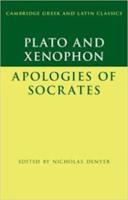
CUP (2019) p/b 148pp £19.99 (ISBN 9780521145824)
D. has produced a relatively slim volume for this series. His selection of material and economy with words has produced both a well-targeted introduction and commentary, full of pertinent detail without excess.
To put these two works by these authors in the same volume is to invite comparison. As D. notes, there are reports of their rivalry and competitiveness in Diogenes Laertius, Aulus Gellius and Athenaeus, but it is strange that of the two main sources for Socrates neither makes significant mention of the other (Xen. Memorabilia 3.6.1 has a passing reference to Plato). D.’s focus is on more significant differences, whether the narrative style (Xenophon framing works in person—Plato more ‘self-effacing) or the ambitiousness of the dialogues, with Plato’s being ‘more intellectually demanding’. But D. does not fail to give credit to Xenophon for the versatility of his output in contrast to Plato’s limited repertoire (dialogue upon dialogue, but also some letters and poems).
There are discussions of the familiar problems, such as whether the effects of hemlock are painful or numbing. On the important issue of the nature of Socrates’ ‘inner voice’, or as D. more accurately calls it, ‘supernatural sign’, D. examines the references both in these two texts (θεῖόν τι καὶ δαιμόνιον and φωνή τις Pl. 31d3-4, τὸ τοῦ θεοῦ σημεῖον Pl. 40b3-4, τὸ δαιμόνιον Xen. 4.18-19) and elsewhere. The prominent version is that it always advises him against doing something. At Xen. 12.23-4 however, it tells him what it is necessary to do (ὅτι χρὴ ποιεῖν). The nature of the voice is discussed in the introduction, where D. brings together the arguments of Socrates in Plato and Xenophon and examines their logic. Plato perhaps ‘was simply conceding that Socrates was guilty’ on the charge of introducing new gods. Xenophon’s Socrates claims that if bird song can be prophetic, his inner voice can too; but this fails to convince since birds are merely a way of communication used by the gods, not prophets themselves.
The notes provide considerable support for readers of the text, with grammatical explanations and translations where appropriate. Vocabulary too receives attention: for example, D. is not content with ‘ignorance’ for ἀμαθία (22e2-3) but observes that in Plato its meaning ‘is always worse than simply not knowing’ and he offers ‘false belief’ and ‘getting things wrong’ according to the context. νομίζειν is a key word in the indictment, meaning not simply thinking gods exist, but to have the ‘proper respect’ for them. D. also notes particular expressions characteristic of the author: οὐδὲν δὲ δεινὸν μή at 28b2 is translated ‘there’s no fear that …’ and identified as a ‘turn of phrase Plato much liked.’
Accents are occasionally discussed: at 19b3-4 D draws attention to the difference between κατηγόρων and κατηγορῶν; at 19c1-2 he explains why τίς (here indefinite, not interrogative pronoun) is accented (because it is followed by the enclitic ἐστιν); at 19c5 on πέρι he points out that the accent is on the penultimate syllable as usual for dissyllabic prepositions when they are postponed. Some particles too receive attention, on γε μήν for example (Xen. 12.22) ‘this turn of phrase was a favourite of Xenophon’s’. Even πρός + acc. attracts D.’s attention at Pl. 28a-b ‘the most general term for being related in some way or other’.
Robin Waterfield (introduction to his Penguin translation) called Xenophon’s apologia ‘a rather scrappy little work’ and it has been naturally overshadowed by Plato’s more eloquent version. D. does not seek to redress the balance, but gives both authors the degree of attention that will be invaluable for advanced students reading these texts. Here is yet another excellent contribution to this series.
Alan Beale
